Eating Aware
BV students adapt to healthy-eating lifestyles
Hope Brown & Gennifer Geer
Processed food is available in every store and pantry in Johnson County. Chips, cookies, soda and other sugar-filled treats contaminate grocery store shelves. However, the recent onslaught of processed foods in the health-conscious community endangers junk food’s sustainability. Students at Blue Valley have taken steps to be more conscious of what they’re eating, considering everything from health to moral impacts. Ranging from veterans to newcomers to diverging from the standard American diet, these students share their food alternations.
The Nutrition Aficionado
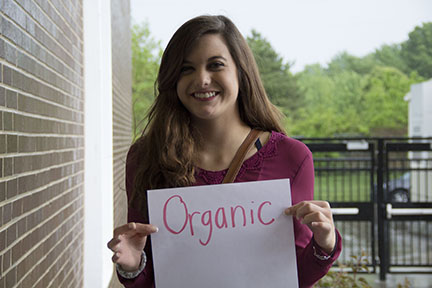
Smiling in the rain, junior Sydney Anderson displays her favor for organic foods. Anderson tried a diet free from processed foods, but decided to revert to a more traditionally healthy diet. “I just make sure to eat my servings of fruit and veggies,” Anderson said
Junior Sydney Anderson said she aims to follow a healthy lifestyle, even attempting to refine her diet.
“I did a diet where you only eat all real food, so no sugar, processed food, or grains,” she said. “It’s just to give you more energy.”
She said though she thought it was a good idea, her family wasn’t confident in the nutritional aspects of the diet.
“My parents weren’t sure with it,” Anderson said. “I only did it for 3 to 4 days because I wasn’t getting enough protein in my system and not getting enough calories.”
She said she also wished she could have eaten certain foods.
“I just missed my Special K and coffee,” she said. “I would probably do it during the summer where I could plan out my meals more thoroughly.”
Anderson said not planning meant her food had little variety.
“I thought it would be easier too, but it was a little harder than anticipated,” she said. “I just ate a lot of salads, with chicken or plain with some dressing that met the criteria. [For] lunch I just packed salad and fruit.”
She said she thinks some processed foods are beneficial.
“I know carbs aren’t the greatest but you need some grains for fiber,” Anderson said. “You can always get less processed food at the farmers’ market. Processed food has a lot of added vitamins and iron, which is good for keeping a good system.”
Despite not having a diet with set rules, Anderson still eats healthfully.
“I still eat the same stuff like salad and fruit,” she said. “I make fresh food like salmon and kale.”
The Cavewoman Diet
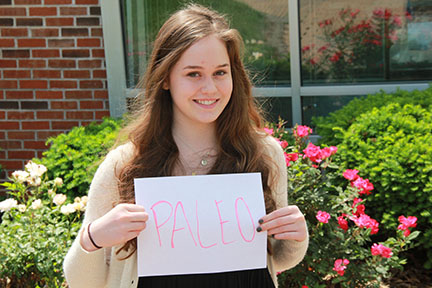
Flashing a grin, sophomore Grace Hermes presents her choice in lifestyle with the Paleo diet. Hermes chose to become Paleo after dabbling with veganism. “With the vegan diet, I lost a lot of weight, but I wasn’t eating healthy,” Hermes said.
As her New Year’s resolution, sophomore Grace Hermes said she decided to follow the Paleo diet.
“[Paleo] means that you don’t eat sugar or processed food,” Hermes said. “So, your diet consists of meat, vegetables, fruits and nuts. You also cannot eat legumes, so that gets rid of peanuts.”
The Paleo diet is often referred to as the “Caveman Diet” because one consumes the same food that cavemen ate.
“They call it the caveman diet just because the food is clean not processed,” Hermes said.
After attempting a vegan lifestyle, Hermes said she chose to switch to the Paleo diet because she wanted to be in the best physical shape attainable.
“I was vegan last year,” Hermes said. “I just wanted to do something else this year. I had a dance competition, and I wanted to be in the best shape for it.”
Hermes said she abandoned a plant-based diet because it did not help her choose healthier food options.
“With the vegan diet, I lost a lot of weight, but I wasn’t eating healthy,” Hermes said. “I would eat chips and guac everyday. That satisfied my cravings because you could have carbs, and that’s what I craved the most. But with the vegan diet I would crave protein and eggs which your body needs more than carbs.”
The Paleo diet became her resolution for 2015 because Hermes said she wanted to control her eating habits.
“My goal was this whole year,” she said. “Food is good in proportions. I want to practice conscious eating.”
Hermes said a typical day of meals includes a combination of juices, vegetables and meat.
“[I eat] a green smoothie in the morning with kale, spinach, apple and banana,” she said. “I drink coffee a lot, which you’re not supposed to, but I like coffee. [I eat] lots of protein. I’ll make protein shakes. I [also] eat a lot of chicken and fruit.”
Although her food options are restricted, Hermes said she still obtains the necessary nutrition for a healthy life.
“It’s not like I’m starving myself,” she said. “I’m satisfied all of the time.”
Hermes said she relinquishes her food restrictions on Fridays and indulges in her favorite foods.
“Friday nights are cheat nights,” she said. “I’m not a picky eater. I like all foods. Ice cream is my favorite. You can make ice cream homemade with coconut milk.”
After following the Paleo diet for 5 months, Hermes said she observed positive results.
“I noticed that my energy levels have gone up,” she said. “The longer you do any sort of diet, the less cravings you have.”
Although Hermes only plans to be Paleo for this year, she said she anticipates a change in her eating habits for the future.
“After this year, I’m hoping that with anything I eat, the intention is to nourish my body, not just to eat for the sake of eating,” Hermes said.

Sitting outside during lunch, sophomore Grace Hermes unscrews her homemade smoothie. Hermes said the Paleo diet consists of meat, vegetables, fruit and nuts. “They call it the caveman diet because the food is clean and not processed,” Hermes said.
The Animal Lover
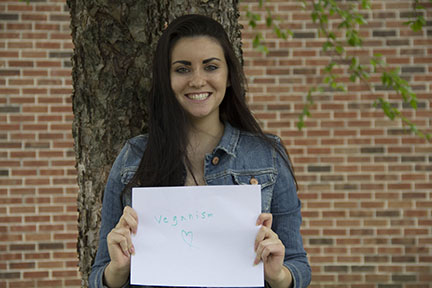
Showing off her diet of compassion, junior Amelia Andrews models her love for animals. Andrews recently started her vegan journey. “It is better for the environment, so I feel a lot better about myself doing this,” she said.
Junior Amelia Andrews abstains from eating meat, eggs or milk, otherwise known as being vegan, for six weeks.
“It’s not as hard as I thought,” Andrews said. “I have to check labels to be safe to make sure anything I eat doesn’t have eggs, milk or anything like that.”
She said her decision stemmed from her interaction with farm animals.
“Personally, for me I felt like it was the right thing to do,” she said. “I take care of chickens and sheep. I just felt it wasn’t right to eat animals, and I always planned on becoming a vegetarian. I thought to take it even further because to me, it doesn’t make sense to eat eggs.”
Andrews said she is confident in her decision to be vegan.
“It is better for the environment, so I feel a lot better about myself doing this,” she said.
Though she is happy about her choice, Andrews said her parents are hesitant to accept it.
“My mom is a bit concerned because she feels I don’t get enough protein,” Andrews said. “They’re old-fashioned. So, my dad finds it ridiculous, but my mom is OK with it.”
She said some of her favorite foods were vegan to begin with.
“I really like hummus [or] guacamole with carrots,” she said. “I have rice and beans for a lot of protein, and then I have cereal. Those are my favorite meals.”
Andrews said vegan food isn’t hard to accomodate.
“You adjust anything you want,” she said. “There’s vegan ice cream. There’s nothing you’re missing out on. Tofu, to be honest, is really good and can taste just like meat. It’s not hard.”
Though she admitted she was nervous to start, Andrews said abundant resources helped her adjust.
“At first, I was really scared,” she said. “I was looking at things like, ‘I’m never going to eat this again.’ But, if you go online, there are so many vegan things on Instagram and recipes.”
Andrews said she didn’t find the transition too difficult due to her previous eating habits, but she still had to set a clear goal.
“I did set a day where, ‘OK, this is my day. I’m going to start immediately being vegan,’” she said. “I didn’t eat red meat a lot, so when I did eat meat, it was mainly fish and chicken.”
She said she is determined to follow through with her decision to be vegan.
“I did want to have a cheat day where I eat whatever I want,” Andrews said. “But then I thought about it, and I realized I don’t need that. There are no many options that I’m not deprived. I know it’s benefitting the environment and animals, so I plan on doing it for the rest of my life.”
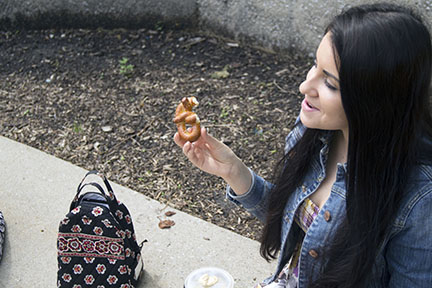
Chatting with her friends, junior Amelia Andrews munches on a prezel. Andrews said nearly any food can be turned vegan. “I don’t feel deprived,” she said.
The Veg from Birth
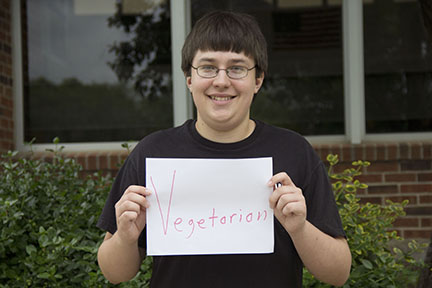
Exhibiting his choice in diet, junior Nathan Luzum embraces his meatless lifestyle. Luzum has been vegetarian for his entire life. “I assume my parents would be fine with me eating meat if I wanted to,” he said.
Unlike others who make a separate decision, junior Nathan Luzum was raised without meat.
“I remember in elementary school in first grade where I noticed that some other kids had stuff that looked really weird on their plates,” Luzum said. “I knew about meat — I just hadn’t seen it a lot.”
He said he adjusted to others eating meat as time went on.
“At first, I was pretty disgusted by it,” Luzum said. “I sometimes had trouble eating my lunch or tried to move so that I was farthest away from the person with the smelly corndog or hotdog or chicken nuggets. By the time I got to third or fourth grade, it’s perfectly normal eating next to somebody who has meat. It didn’t gross me out at all.”
Though he views eating meat as normal, Luzum said he doesn’t plan on doing it himself.
“I have no interest in eating meat because the first years of my life, I didn’t really have a choice,” he said. “I assume my parents would be fine with me eating meat if I wanted to. I choose to remain a vegetarian because it’s how I’ve been raised. It’s easiest not to change and stay that way.”
Luzum said he plans to raise his children in the same tradition his parents started when they were in their 20s.
“I’m pretty sure [my parents went vegetarian] for health reasons because I know that was a time where it was toward the end of the hippie movement,” he said. “There was a lot of information circulating around about the dangers of meat, and there’s possibly a moral aspect as to why they became vegetarian.”
He said the vegetarian meals he eats aren’t extremely strange.
“Usually when we eat at home and cook dinner, it could be something with vegetables in it like a meatless chili or veggie burgers,” he said. “We can cook tempeh in some pizza sauce, or we make lentils and sometimes we try various veggie dishes. Then, of course, sometimes it’s just plain pasta with sauce. Nothing too out of the world.”
Luzum said his simple tastes have remained with him.
“Throughout my life I’ve always said my favorite food was pasta,” he said. “I like pasta a lot. In fact, when I was two or three I went to the mall and sat on Santa’s lap. He asked me what I wanted, and I said ‘I’d like bread and pasta, please.’”
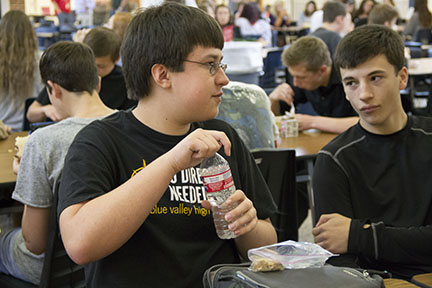
Setting down his sandwich, junior Nathan Luzum takes a drink of water. Luzum was raised vegetarian. “I hadn’t eaten with people who were actually eating meat a lot” Luzum said.
The Whole Focus
![Laughing with excitement, junior Daniela Litardo waves her ‘Whole 30’ sign. Litardo has followed the diet 4 times this year. “I usually only do [Whole 30] for 30 days because your body needs more protein,” Litardo said.](https://bvtigernews.com/wp-content/uploads/2015/05/daniela-mug-web.jpg)
Laughing with excitement, junior Daniela Litardo waves her ‘Whole 30’ sign. Litardo has followed the diet 4 times this year. “I usually only do [Whole 30] for 30 days because your body needs more protein,” Litardo said.
“It is not a diet,” Litardo said. “It’s just a lifestyle. I live a Whole 9 lifestyle, which means I stay away from gluten, dairy products, anything processed, anything that’s not organic [and] anything that’s not natural.”
Because she is not allowed to eat certain foods, Litardo said Whole 30 requires an extensive knowledge of all food she ingests.
“The main things I don’t eat [are] gluten, dairy [and] sugars,” Litardo said. “My eggs have to be free-range pasturized. I have to know where my meat comes from.”
Litardo said she prefers vegetables over fruits because of the high sugar count fruits contain.
“I mainly eat simply, which means that I eat a lot of vegetables,” Litardo said. “I stay away from eating a lot of fruit because they have sugar. Even though it’s natural sugar, I can’t have that much.”
To begin her days, Litardo said she prepares a healthy and balanced breakfast.
“My favorite [meal] would be breakfast,” Litardo said. “I love eggs, and Lara Bars are really great. I usually have that with black coffee, and that’s my favorite thing. My breakfasts are usually super small but super filling.”
Litardo said she brings the rest of her dinner to school for lunch.
“For lunch, I usually have leftovers that I had for dinner,” Litardo said. “So, if I were to have fajita boats — it’s fajitas in lettuce — I would bring that to school the next day. Usually I eat chicken, eggs, turkey, sweet potato and grilled veggies.”
Litardo said the Whole 30 program improved her emotions and physical appearance.
“Whenever I get off these foods, I sleep better, my skin looks better, I’m in a better mood, I can concentrate and it’s just pretty amazing,” Litardo said.
Although Litardo usually follows the Whole 30 program for 30 days, she said she cannot commit to an indefinite number of days.
“I usually only do [Whole 30] for 30 days because your body needs more protein,” Litardo said.
While Litardo said Whole 30 is beneficial, she said while on the program she is unable to consume regular food without getting ill.
“When you’re off of that stuff for so long, say if I have a wedding to attend, and I have to eat, then I will get so sick,” Litardo said. “I need to get my body used to eating regular food.”
Healthy eating can cause friction in her social life, Litardo said.
“I am a huge foodie,” Litardo said. “Food is one of my favorite things in the whole world. Whenever [my friends and I] go out, we usually go to dinner. It’s actually unfortunate because I’m friends with people who don’t really make good decisions while eating. It’s hard because they don’t want to put me in that situation where they’re eating a burger or sushi, and I’m just over there eating asparagus.”
Although Whole 30 is difficult at times, Litardo said the program helped her recognize the downfalls in society’s eating habits.
“I decided to do this because once you read into it, it’s just crazy how much food controls our lives,” Litardo said. “We grow up with food that’s normal to us, but when you take it out of your diet, it makes a huge difference.”
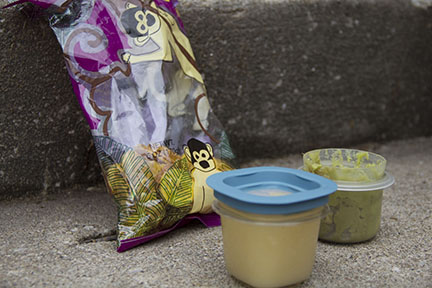
Placing her plantains, applesauce and guacamole on the ground, junior Daniela Litardo displays a typical Whole 30 lunch. Litardo said she usually brings leftover dinner to school. “I stay away from eating a lot of fruit because they have sugar,” she said. “Even though it’s natural sugar, I can’t have that much.”
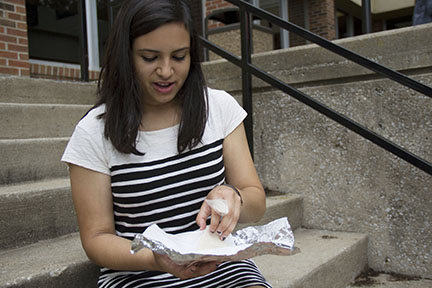
Unwrapping her lunch, junior Daniela Litardo prepares to eat a slice of turkey. Litardo attempts to follow the Whole 30 diet 5 times throughout the year. “I mainly eat simply, which means that I eat a lot of vegetables,” Litardo said.
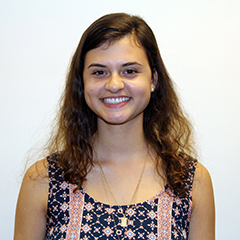
Hope Brown is the Features Editor of “The Tiger Print.” She loves to write stories and attempt to design pages. Outside of newspaper, Hope is a member...



